Rinaldo, Glyndebourne Festival Opera | reviews, news & interviews
Rinaldo, Glyndebourne Festival Opera
Rinaldo, Glyndebourne Festival Opera
Still teething, this latest Handel production should grow into a mature hit
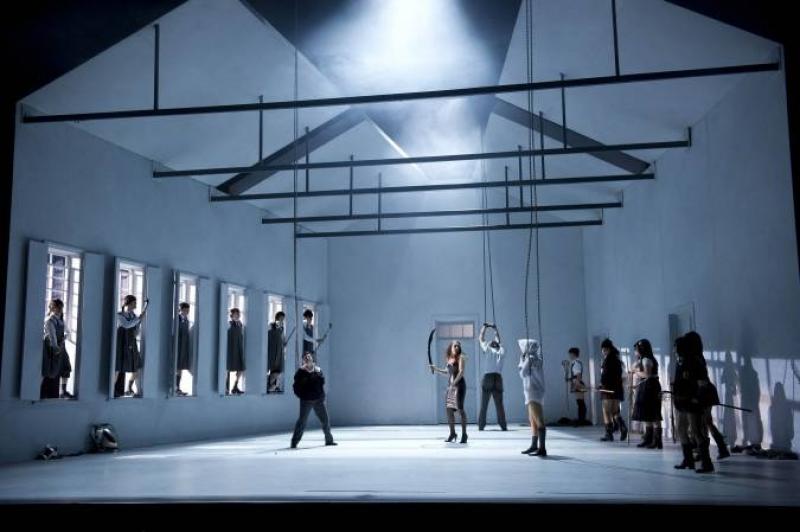
Each Handel opera (or the good ones at any rate) has its own musical colour and character.
It’s triumphal stuff, musically as unsubtle as its psychology, but this is the very joy of it. The human complexities of Alcina and Orlando are still far in the distance (even the emotive “Lascia ch’io pianga” is a manipulative escape attempt on the part of Almirena), and this pageant of lovely tunes and stock characters fills a summer evening with artful delight.
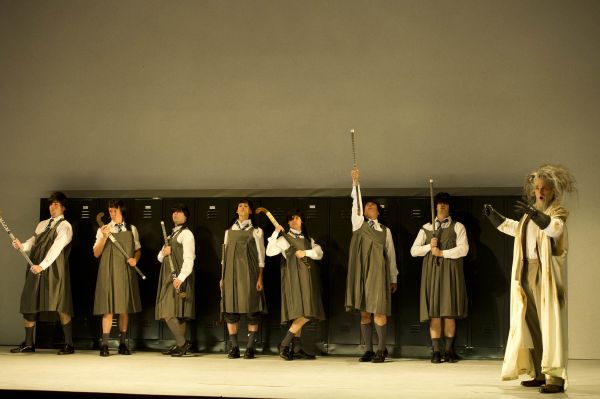 In Carsen’s daydream vision, Christian knight Rinaldo finds himself a schoolboy geek, carefully pasting a photo of his beloved Almirena (all specs and plaits) under the lid of his desk. Fantasising his way out of teasing and torment, he and his schoolmates are transformed into warriors, facing off against the evil Saracens (teachers) led by sorceress Armida and her consort Argante. Familiar school spaces, gym, dormitory, playground, become their theatre of war, and Armida’s Furies are revealed as what else but St Trinian’s-inspired schoolgirls.
In Carsen’s daydream vision, Christian knight Rinaldo finds himself a schoolboy geek, carefully pasting a photo of his beloved Almirena (all specs and plaits) under the lid of his desk. Fantasising his way out of teasing and torment, he and his schoolmates are transformed into warriors, facing off against the evil Saracens (teachers) led by sorceress Armida and her consort Argante. Familiar school spaces, gym, dormitory, playground, become their theatre of war, and Armida’s Furies are revealed as what else but St Trinian’s-inspired schoolgirls.
The slightly laborious transpositions of the opening relax as we proceed, and by the time bicycles are rearing and pawing like horses and a final battle is reworked as a football match (globe as ball), Carsen has his audience exactly where he wants them, squealing with delight over each new visual gag and practically expiring at the giddy comedy of a cross-dressing episode.
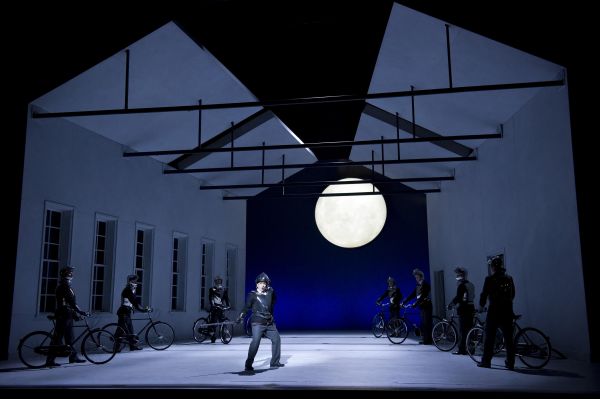 All didn’t go entirely to plan on opening night however; a power cut extinguished Rinaldo’s beautiful lament “Cara sposa” midway, breaking the tension Sonia Prina had worked so hard to draw out of the scenario, and the spectacular exit we’d been promised after “Venti turbini” failed to materialise. Yet all this was nothing to the problems plaguing pit and stage ensemble.
All didn’t go entirely to plan on opening night however; a power cut extinguished Rinaldo’s beautiful lament “Cara sposa” midway, breaking the tension Sonia Prina had worked so hard to draw out of the scenario, and the spectacular exit we’d been promised after “Venti turbini” failed to materialise. Yet all this was nothing to the problems plaguing pit and stage ensemble.
After an overture that pulsed and swaggered with quality, Ottavio Dantone and The Orchestra of the Age of Enlightenment seemed to lose their way. Juddering with the lack of synchronicity, orchestra and soloists elbowed their way through the doorway of each cadence, scrambling inelegantly to arrive together. With so many arias demanding exposed unison between soloist and accompanying melody instrument any deviation is fatal, and so it proved here.
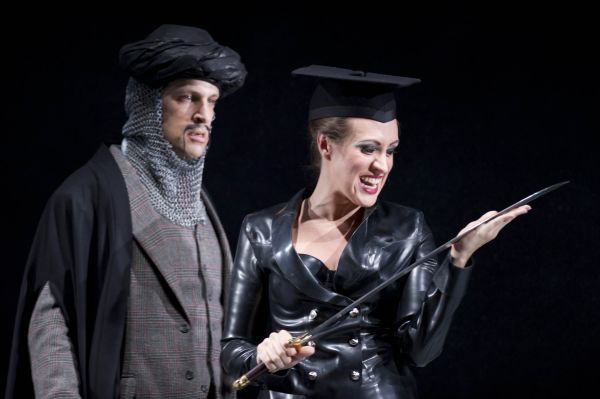 Whether it was Dantone’s swift speeds and bizarrely irrational tempo relationships, a lack of listening from the singers (Prina was particularly guilty, rushing her coloratura and dragging after every breath), or challenging direction that caused the issue is unclear, but the result was a seasick first half that needed a good few days in the rehearsal room to settle.
Whether it was Dantone’s swift speeds and bizarrely irrational tempo relationships, a lack of listening from the singers (Prina was particularly guilty, rushing her coloratura and dragging after every breath), or challenging direction that caused the issue is unclear, but the result was a seasick first half that needed a good few days in the rehearsal room to settle.
There’s no denying Prina’s technical solidity, the articulated precision of her coloratura and her projected lower register will keep her in roles as long as they last, but I still struggle to take pleasure in her voice. Its rough-and-tumble colours, though peculiarly suited here to an adolescent boy, too often seem pushed. Varduhi Abrahamyan’s Goffredo may have been slighter, but her rounded tone made for a much more attractive, if less dynamic, listening experience.
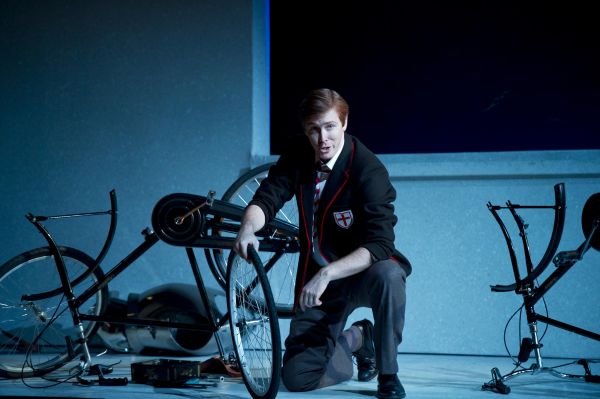 A late substitute for Sandrine Piau, Anett Fritsch was a solid Almirena, though outshone for vocal promise by Brenda Rae’s Armida (pictured above with Pisaroni). Rae shows all the signs of a really outstanding voice in the making, and while there are still some uneven moments, her sorceress was a worthy match for Luca Pisaroni’s Argante.
A late substitute for Sandrine Piau, Anett Fritsch was a solid Almirena, though outshone for vocal promise by Brenda Rae’s Armida (pictured above with Pisaroni). Rae shows all the signs of a really outstanding voice in the making, and while there are still some uneven moments, her sorceress was a worthy match for Luca Pisaroni’s Argante.
Singing everyone else into the shadows in Act I, Pisaroni’s easy stage presence (not aided by some contrived direction) and sooty tones recalled his previous Glyndebourne star turn as Leporello. Mention must also be made of Tim Mead’s Eustazio (pictured above). Focused of tone and displaying the musicianship so lacking elsewhere, his curtain-call cheers were well deserved.
With classic productions of Giulio Cesare and Rodelinda, Glyndebourne have established themselves as the go-to company for Handel opera. While Carsen’s Rinaldo still has its adolescent growing pains to face, it has the makings of a challenger to these mature productions. As the run progresses musical issues will settle, and I imagine the resulting clarity will reveal in Rinaldo another triumph, no less significant for being joyously silly.
Explore topics
Share this article
Add comment
The future of Arts Journalism
You can stop theartsdesk.com closing!
We urgently need financing to survive. Our fundraising drive has thus far raised £49,000 but we need to reach £100,000 or we will be forced to close. Please contribute here: https://gofund.me/c3f6033d
And if you can forward this information to anyone who might assist, we’d be grateful.

Subscribe to theartsdesk.com
Thank you for continuing to read our work on theartsdesk.com. For unlimited access to every article in its entirety, including our archive of more than 15,000 pieces, we're asking for £5 per month or £40 per year. We feel it's a very good deal, and hope you do too.
To take a subscription now simply click here.
And if you're looking for that extra gift for a friend or family member, why not treat them to a theartsdesk.com gift subscription?
more Opera
 The Makropulos Case, Royal Opera - pointless feminist complications
Katie Mitchell sucks the strangeness from Janáček’s clash of legalese and eternal life
The Makropulos Case, Royal Opera - pointless feminist complications
Katie Mitchell sucks the strangeness from Janáček’s clash of legalese and eternal life
 First Person: Kerem Hasan on the transformative experience of conducting Jake Heggie's 'Dead Man Walking'
English National Opera's production of a 21st century milestone has been a tough journey
First Person: Kerem Hasan on the transformative experience of conducting Jake Heggie's 'Dead Man Walking'
English National Opera's production of a 21st century milestone has been a tough journey
 Madama Butterfly, Irish National Opera review - visual and vocal wings, earthbound soul
Celine Byrne sings gorgeously but doesn’t round out a great operatic character study
Madama Butterfly, Irish National Opera review - visual and vocal wings, earthbound soul
Celine Byrne sings gorgeously but doesn’t round out a great operatic character study
 theartsdesk at Wexford Festival Opera 2025 - two strong productions, mostly fine casting, and a star is born
Four operas and an outstanding lunchtime recital in two days
theartsdesk at Wexford Festival Opera 2025 - two strong productions, mostly fine casting, and a star is born
Four operas and an outstanding lunchtime recital in two days
 The Railway Children, Glyndebourne review - right train, wrong station
Talent-loaded Mark-Anthony Turnage opera excursion heads down a mistaken track
The Railway Children, Glyndebourne review - right train, wrong station
Talent-loaded Mark-Anthony Turnage opera excursion heads down a mistaken track
 La bohème, Opera North review - still young at 32
Love and separation, ecstasy and heartbreak, in masterfully updated Puccini
La bohème, Opera North review - still young at 32
Love and separation, ecstasy and heartbreak, in masterfully updated Puccini
 Albert Herring, English National Opera review - a great comedy with depths fully realised
Britten’s delight was never made for the Coliseum, but it works on its first outing there
Albert Herring, English National Opera review - a great comedy with depths fully realised
Britten’s delight was never made for the Coliseum, but it works on its first outing there
 Carmen, English National Opera review - not quite dangerous
Hopes for Niamh O’Sullivan only partly fulfilled, though much good singing throughout
Carmen, English National Opera review - not quite dangerous
Hopes for Niamh O’Sullivan only partly fulfilled, though much good singing throughout
 Giustino, Linbury Theatre review - a stylish account of a slight opera
Gods, mortals and monsters do battle in Handel's charming drama
Giustino, Linbury Theatre review - a stylish account of a slight opera
Gods, mortals and monsters do battle in Handel's charming drama
 Susanna, Opera North review - hybrid staging of a Handel oratorio
Dance and signing complement outstanding singing in a story of virtue rewarded
Susanna, Opera North review - hybrid staging of a Handel oratorio
Dance and signing complement outstanding singing in a story of virtue rewarded
 Ariodante, Opéra Garnier, Paris review - a blast of Baroque beauty
A near-perfect night at the opera
Ariodante, Opéra Garnier, Paris review - a blast of Baroque beauty
A near-perfect night at the opera
 Cinderella/La Cenerentola, English National Opera review - the truth behind the tinsel
Appealing performances cut through hyperactive stagecraft
Cinderella/La Cenerentola, English National Opera review - the truth behind the tinsel
Appealing performances cut through hyperactive stagecraft

Comments
...